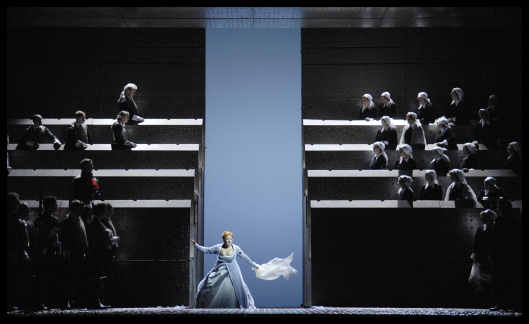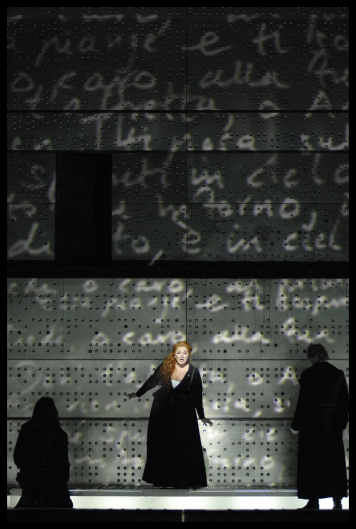Other Links
Editorial Board
-
Editor - Bill Kenny
-
Deputy Editor - Bob Briggs
Founder - Len Mullenger
Google Site Search
SEEN
AND HEARD INTERNATIONAL OPERA REVIEW
Bellini, I Puritani: Soloists, Orchestra and Chorus of De Nederlandse Opera. Conductor: Giuliano Carella. Het Muziektheater, Amsterdam, 11.2.2009 (SRT)
Cast:
Mariola
Cantarero as Elvira
Giuliano Carella’s conducting was fine: pacing was generally well
judged, though he carried on regardless in the great climax of
Suoni la tromba, thereby making it feel rather underpowered. He
even included a trio which I had never heard before: it takes place
in Act 1 for Arturo, Riccardo and Enrichetta just before Elvira’s
entrance. It holds up the action unnecessarily, so it’s easy to see
why it’s cut, but it sounds lovely, and the voices blended very well
indeed.
Elvira – Mariola Cantarero
Arturo – John Osborn
Riccardo – Scott Hendricks
Giorgio – Riccardo Zanellato
Enrichetta – Fredrika Brillembourg
Orchestra and Chorus of De Nederlandse Opera
Giuliano Carella (conductor)
Production:
Francisco Negrin (director)
Es Devlin (designer)
Bruno Poet (lighting designer)
Louis Désiré (costume design)

All the lead singers are fantastic in their roles. Mariola
Cantarero takes a while to warm up as Elvira, but when she does so
her tone is bright and clear. If some of the top notes in the mad
scene sound a bit shrill then this merely heightens the sense of a
mind gone deranged, and she copes with the coloratura very well
indeed. Scott Hendricks’ baritone is honeyed and mellifluous. His
aria and cabaletta in the opening scene are really beautiful, and he
rises to the challenge of his duet with Arturo with thrilling
skill. Riccardo Zanellato’s Chaplain is authoritative and
sonorous. His Cinta di fiori in Act 2 is really moving,
while he is a convincing father figure to Elvira in the second scene
of Act 1. John Osborn’s Arturo steals the show, however. The role
was originally to have been sung by Eric Cutler, but Osborn’s
singing far surpassed Cutler’s on his Met DVD. There is a bright
ring to his voice which reminded me of Juan Diego Florez and the top
notes hold no traumas for him. His C sharp in A te, o cara
was confident, thrilling and long! The same was true for the
top Ds in Vieni fra queste braccia and, most thrillingly of
all, he went for and hit the top F in Credeasi, Misera. A
fantastic performance to be proud of. If he looks after his voice
then he could well become the new leading leggiero tenor of our day.

The production itself was a take-or-leave affair. Costumes were
well observed in the 17th century style, though the set
was made of metal and looked a bit space age. Each area of the
walls was studded with Braille to show, the director suggested, that
most of the characters unwittingly followed dogma – that’s why they
were all running their hands over it so much. Elvira and Arturo, on
the other hand, write so they break out of this limited world
and into something new. The boldest touch is saved for the end.
When Arturo is surprised by the other Puritans he is shot in the
chest, turning Credeasi Misera into a (quite convincing)
death aria. Elvira then returns to her madness and the whole scene
with Cromwell’s letter and Arturo’s pardon takes place only in her
head. At the end of the scene Arturo is dead, and with him her
dreams of happiness. It’s fine, but it meant that the final
ensemble was sung mostly behind a curtain which inevitably detracted
from its power.
Still, nothing could dull my enjoyment of the best bel canto I’ve
heard in many years. A great evening that, with any luck, might
inspire a revival of this fantastic opera for schedulers around the
world.
Pictures © Clärchen
and Matthias Baus
Back
to Top
Cumulative Index Page
